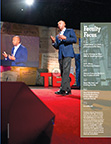Introducing Alan Sykes
Robert A. Kindler Professor of Law
Printer Friendly VersionInternational law and economics scholar Alan Sykes is a low-key, no-nonsense kind of guy. His résumé presents the facts without embellishment. He drives a decade-old Toyota and wears khakis with golf shirts from Costco. “If you met me on the street you could well imagine that I was an electrician,” says Sykes, who goes by the name Al.
A model of efficiency in the classroom, he answers questions briefly, keeps the class moving, and has been known to give a crash course in microeconomics in one session. “Whereas other professors go off on tangents, every word he says is valuable. There is no excess,” says Kendall Turner, a student at Stanford Law School, where Sykes has taught since 2005.
Not one to beat around the bush, if he’s unhappy with his co-author’s work, Sykes will delete or rewrite it, says frequent co-writer Eric Posner of the University of Chicago Law School. Likewise, his straight-shooting approach is reflected in the content of his scholarship. “A lot of international legal scholars write about the world as they wish it were rather than the way it actually is. He’s very skeptical about work that is utopian and too idealistic for states to actually pay attention to,” says Posner, who shares his view.
That pragmatism, coupled international law generally and international trade law specifically that has reshaped the discipline. “He’s really created the modern scholarship in this field,” says Daniel Fischel, also at Chicago. “International law was not looked at in a systematic, analytical, and organized way. He took this hugely important area—dealing with trade agreements between countries, issues of treaties—and analyzed them most rigorously.”
Sykes, who joins the faculty this fall, made a splash in 1984 with “The Economics of Vicarious Liability” (Yale Law Journal), a nontechnical version of a chapter in his economics Ph.D. dissertation. The piece examines when it is economically efficient for one party to be held liable for the conduct of another simply because of the relationship between them (such as employer-employee). In 1995, he coauthored Legal Problems of International Economic Relations—now in its fifth edition—the field’s gold-standard casebook.
More recently, Sykes’s work in the economics of international trade law upends conventional wisdom. In “Currency Manipulation and World Trade” (World Trade Review, 2010), Sykes and co-author Robert Staiger question the commonly held view that Chinese currency practices significantly distort trade. They argue that the effects of unexpected devaluations decay over time and depend in the short run on how goods are priced.
Currently, Sykes and Posner are collaborating on a book, Economic Foundations of International Law (Harvard University Press, 2012). Its overriding objective is to use economic analysis to shed light on international law across a range of subject areas, including trade and investment, monetary law, international criminal law, and even the law of war. While there is no single conclusion, the authors show how international law responds to a wide range of externalities, some of which are far more amenable to solutions than others.
“He’s one of the few scholars in international trade law that combines law and economics, and does so in a readily accessible way. His forthcoming book will undoubtedly become the seminal reference work on international economic law,” says Michael Trebilcock, chair in Law and Economics at the University of Toronto. Sykes, 57, was brought up in a middle-class suburb of Washington, D.C., with his younger brother, Edward. His father and namesake was a scientist for the U.S. Department of Defense. His late mother, Emily, left her position as a defense department mathematician to raise her children.
Sykes was a studious kid who played the oboe. In high school, he added debate to the mix. “Most of the popular kids were the athletes. That was not me,” he says.
Entering William & Mary without a clue as to what he wanted to study, Sykes took a smattering of classes and realized that “economics resonated. It wasn’t soft and mushy, and it seemed relevant.” He also joined the debating team, where he met Maureen Gorman. They married in 1980 and have two children: Madeleine, 20, a junior at New York University, and Sophie, 17. Maureen is a partner at the law firm Mayer Brown.
In 1976, after graduating Phi Beta Kappa and with honors, he spent six years at Yale studying economics and law. Sykes earned his J.D. in 1982 and became a litigator at Arnold & Porter in Washington, D.C., which exposed him to international trade law. “I had a great time and could have imagined staying there,” he says. But Fischel and Judge Frank Easterbrook (then at the University of Chicago Law School), impressed by Sykes’s editing of an article of theirs at the Yale Law Journal, wooed him. “The chance to do law and economics at the University of Chicago was just too exciting to turn down,” Sykes says. He taught at Chicago for 20 years, finishing his doctorate in economics along the way.
Outside of academics, he and his wife like to travel, but not far off the beaten track. “Our idea of rustic is a Motel 6,” he says. Yet don’t let the regular-guy image fool you. He wears the apron strings in the family, and cooks a variety of spicy Indian curries and other ethnic foods. He likes a good bottle of wine, plays golf and poker, and has a great sense of humor—even at his own expense.
In a parody of Arnold Schwarzenegger’s most famous role, Sykes stars in a Stanford law student video spoof called The Tortinator. Amid a blaze of fire and menacing music, Sykes strides through the door, and is met by students asking about proximate cause and strict liability. He answers in the somewhat robotic way that is characteristic of his manner in class. Sykes says, “I try not to take myself or anyone else too seriously.”
—

